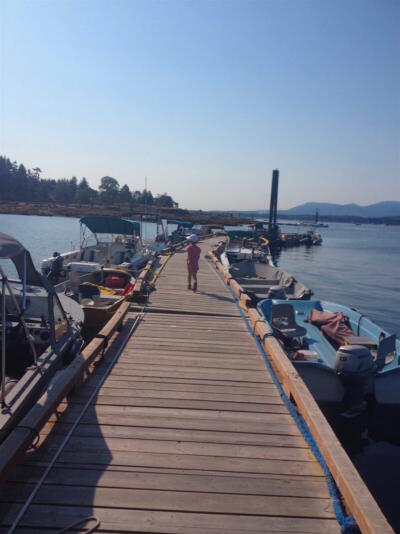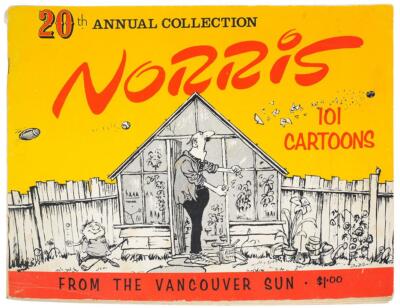#31 Amber McMillan learns the ropes
The Woods: A Year on Protection Island
by Amber McMillan
Gibsons: Nightwood Editions, 2016
$19.95 / 9780889713291
Reviewed by Howard Macdonald Stewart
First published October 26, 2016
*


Amber McMillan is a poet from Toronto now living, happily I hope, on the Sunshine Coast. She has written a highly personal account of her disappointing year on Protection Island, on Nanaimo Harbour. She and her husband fled an unhappy arrangement in Toronto and were hoping for better on the wet coast. They didn’t do a lot of background checking before leaping into their new life on Protection Island, where they found a place, and many of its people, that also proved disappointing, albeit in new ways.
It’s not clear what they might have been expecting from the island. The place is neither fish nor fowl: it’s certainly not a fully-fledged island in the Strait with its own relatively independent community of aging refugees, artists, writers, handy men, dope growers, and other knowledge workers. Nor, with its golf carts and boat dependence, is Protection Island like the rest of suburban Nanaimo; for this at least the author might have been more grateful.

To be fair to McMillan, the island’s name is misleading, unless you are a mariner putting into Nanaimo Harbour. Like the poor souls strung up at Gallows Point on the south end of the island — whose stories McMillan recounts as part of her discovery of the place — the island offered the poet and her family precious little comfort. Their boat didn’t work very well. The private ferry service was expensive and unreliable. It rained a lot from October to April. Many of the neighbours were nosy or noisy, rude or weird. There were skeletons in the closet. Ho hum. And these were among the more engaging bits.
It’s inevitable, I suppose, that an old fart on Denman Island finds that the story of a young Toronto poet’s unhappy year on a suburban island off downtown Nanaimo can run a bit thin at times. Through much of it I couldn’t dispel those haunting, whiny lyrics from Jimmy Morrison: “People are strange, when you’re a stranger….” I was more than a little amazed at her reaction to the place. What was she expecting? A quaint offshoot of a gentrified town like Victoria, something like Sooke or Brentwood Bay maybe? I don’t remember Nanaimo ever being touched by the gentility of parts of the island south of the Malahat.

The mall culture that spread north towards Parksville like a toxic bloom in the latter part of the last century strived to recreate Nanaimo in the anodyne mould of post-Second World war American suburbia. But the middle of town — which is after all what Protection Island connects with — has always been a pretty rough hood. I’ve always thought that cartoonist Len Norris’s depictions of children perpetually throttling one another on the front lawn of the family bungalow was inspired by the culture of Nanaimo’s older residential neighbourhoods. One has to admit that neighbours scuttling your boat when it’s moored in the wrong place is an excessive reaction to the inevitable transgressions of newcomers. But then who ever heard of islanders who depended on a dock that goes half dry at low tide?

Amber McMillan’s description makes it clear that Protection Island is probably a better place to visit than to live. Like Peter Mayle’s rather sunnier year in Provence, her year on Protection Island is clearly told for a distant audience. “The Woods,” indeed! It will be of interest to distant city folk and perhaps to more local readers with the patience to troll through the narcissistic minutiae of other people’s Facebook postings. Like many such tales, it reveals more about the author than the place and begs the question of what the locals thought of their year with the author?
If you’re living in Toronto and thinking of moving to the wet coast, Amber McMillan’s book will be a valuable companion, a reminder especially to do a bit of research before relocating. If you’re looking for explorations of contemporary island cultures on the inland sea, try Grant Buday’s Stranger on a Strange Island or Douglas Hamilton and Darlene Olesko’s Accidental Eden: Hippie Days on Lasqueti Island. For Nanaimo, there is a much richer library to choose from.
*

Howard Macdonald Stewart is an historical geographer and international consultant who writes from Denman Island where he has lived, off and on, for more than thirty years. He has visited more than seventy countries since the 1970s. Now intensely allergic to airplanes, he has contributed many book reviews to BC Studies and, with this review, promises to do the same for The Ormsby Review. His forthcoming book on five parallel histories of the Strait of Georgia / North Salish Sea is scheduled for publication by Harbour Publishing in 2017. It will be based on his doctoral research in the Geography Department at UBC. An insider’s view of his four decades on the road, notionally titled Around the World on Someone Else’s Dime: Confessions of an International Worker, is also a work in progress.
*
References:
Hamilton, Douglas and Darlene Olesko. 2014. Accidental Eden: Hippie Days on Lasqueti Island. Halfmoon Bay: Caitlin Press.
Buday, Grant. 2011. Stranger on a Strange Island: From Main Street to Mayne Island. Vancouver and Point Roberts: New Star Books.
Mayle, Peter. 1989. A Year in Provence. London: Pan Books.
*
The Ormsby Review. More Books. More Reviews. More Often.
Publisher and Editor: Richard Mackie
The Ormsby Review is a journal service for in-depth coverage of B.C. books and authors. The Advisory Board consists of Jean Barman, Wade Davis, Robin Fisher, Cole Harris, Hugh Johnston, Patricia Roy, David Stouck, Maria Tippett, and Graeme Wynn. Scholarly Patron: SFU Graduate Liberal Studies. Honorary Patron: Yosef Wosk. Provincial Government Patron since September 2018: Creative BC
“Only connect.” – E.M. Forster